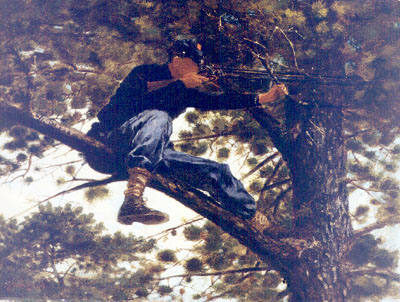 |
| A Sharpshooter on Picket Duty by Winslow Homer |
Alongside paintings of Winslow Homer and Eastman Johnson are photographs (a new medium at the time) of the battlefield of Gettysburg and ditches full of dead bodies. The contrast of unflinching, dark realism in the photographs and the softer allegorical, psychological representation in paintings is striking. All the paintings avoid direct depiction of death. That is not to say the paintings are necessarily inferior to photographs, but the photographs pack a punch to the gut that one cannot easily forget. Perhaps it was unbearable to put death itself directly on the canvas when the war was still going on. Painting the quiet moments between deaths might be the only way to think about war without thinking too much about death.
I whispered to my friend that we don't see this kind of war photographs any more --- though not for lack of wars. No major newspaper or magazine prints images of limp, lifeless bodies with dead eyes staring at the sky. Fifty years ago, they did at least print some unpleasant photos from the Vietnam War. Now, nothing, just words on paper, but people are spared of the horrors of blood and gore, broken limps and dead eyes. The more civilized we become, the more we sanitize and obliterate death from our mind. I wondered aloud whether we would have less war if the public saw more pictures of real death staring at them in their pudgy face.
Nowadays people don't talk much about the Civil War. That's my observation as an immigrant and observer. Yet the ghost of Civil War looms over America. It's never left. It would be impossible to understand this nation and its collective psyche without seeing this long, invisible thread of slavery connecting the "All men are created equal" declaration to this day and dividing the people and their mind (yes, even those who have come after the Civil War cannot escape its shadow in one way or another).

1 comment:
军方发现让记者报导太直接的画面对自己的形象很不好,现在就严格控制。如果发表任何军方不认可的东西,这个记者以后就没有继续跟队的机会了。所以……
Post a Comment